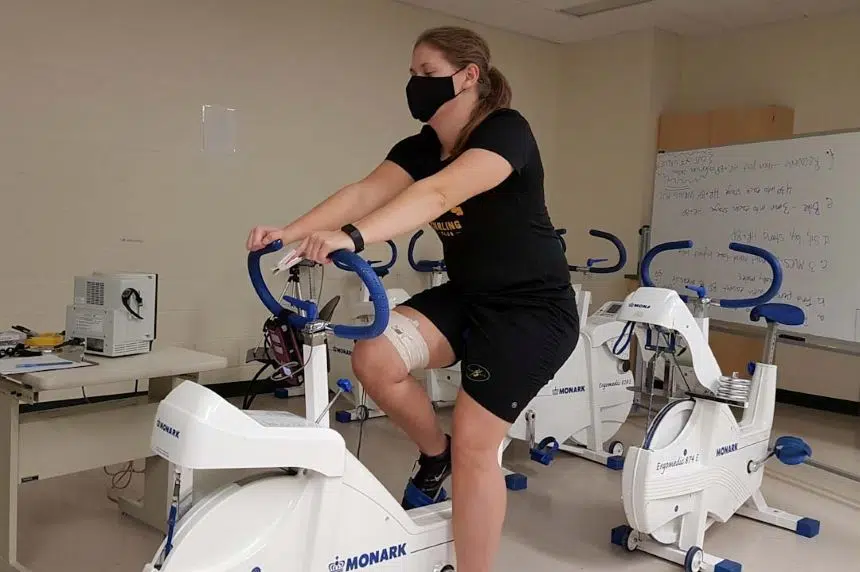A new study from the University of Saskatchewan’s Department of Kinesiology, School of Rehabilitation Science and College of Pharmacy and Nutrition has found that wearing a mask doesn’t have any effect on breathing or oxygen levels in the blood or muscles in young and healthy individuals.
Fourteen participants — seven males and seven females — with an average age of 28 took part in the small study that was published Tuesday in the International Journal of Environmental Research and Public Health.
Speaking with Saskatchewan Afternoon’s Justin Blackwell, study co-author Dr. Philip Chilibeck says researchers came up with the idea for the study after becoming concerned about COVID-19 virus transmission in enclosed gyms.
“For example, there was a gym in Hamilton, a spin-cycle studio where they had a high number of cases and just reading the scientific literature, there seemed to be some cases internationally where they had outbreaks in gyms,” Chilibeck said.
He says the goal is to keep gyms open so that people could keep exercising — and so the researchers decided to evaluate whether wearing a mask could hinder performance.
According to the study, participants wore a three-layer disposable mask or a cloth mask or didn’t wear any kind of mask.
“When expressed relative to peak exercise performance, no differences were evident between wearing or not wearing a mask for arterial oxygen saturation, tissue oxygenation index, rating of perceived exertion, or heart rate at any time during the exercise tests,” the study said. “Wearing a face mask during vigorous exercise had no discernable detrimental effect on blood or muscle oxygenation.”
There have been many potential COVID-19 exposures at gyms across the province reported by the Saskatchewan Health Authority in recent weeks and some gyms now require users to wear a mask while working out.
Chilibeck says the researchers were fortunate as well that they chose the three-layer masks for their study, as they were recommended just days ago by Canada’s chief public health officer, Dr. Theresa Tam.
“Essentially we found that there was no effect on (study participants’) performance across all the conditions, whether they were wearing a mask or not,” Chilibeck said. “And that matched up with our physiological elements.”
However, the literature on mask use while exercising so far hasn’t been clear. According to the World Health Organization (WHO):
“People should NOT wear masks when exercising, as masks may reduce the ability to breathe comfortably. Sweat can make the mask become wet more quickly which makes it difficult to breathe and promotes the growth of microorganisms. The important preventive measure during exercise is to maintain physical distance of at least one metre from others.”
Chilibeck hopes with the publication of the study that more people will also wear masks while playing team sports like hockey and soccer.
“To me, I think it would be a benefit if they could try to wear masks to prevent the spread of COVID, but also to keep their sport going,” he said. “I don’t want to see their hockey season shut down.”
He also hopes to present the findings to the provincial government and chief medical health officer in the hopes of making masks mandatory in gyms and while other sports are also played.











